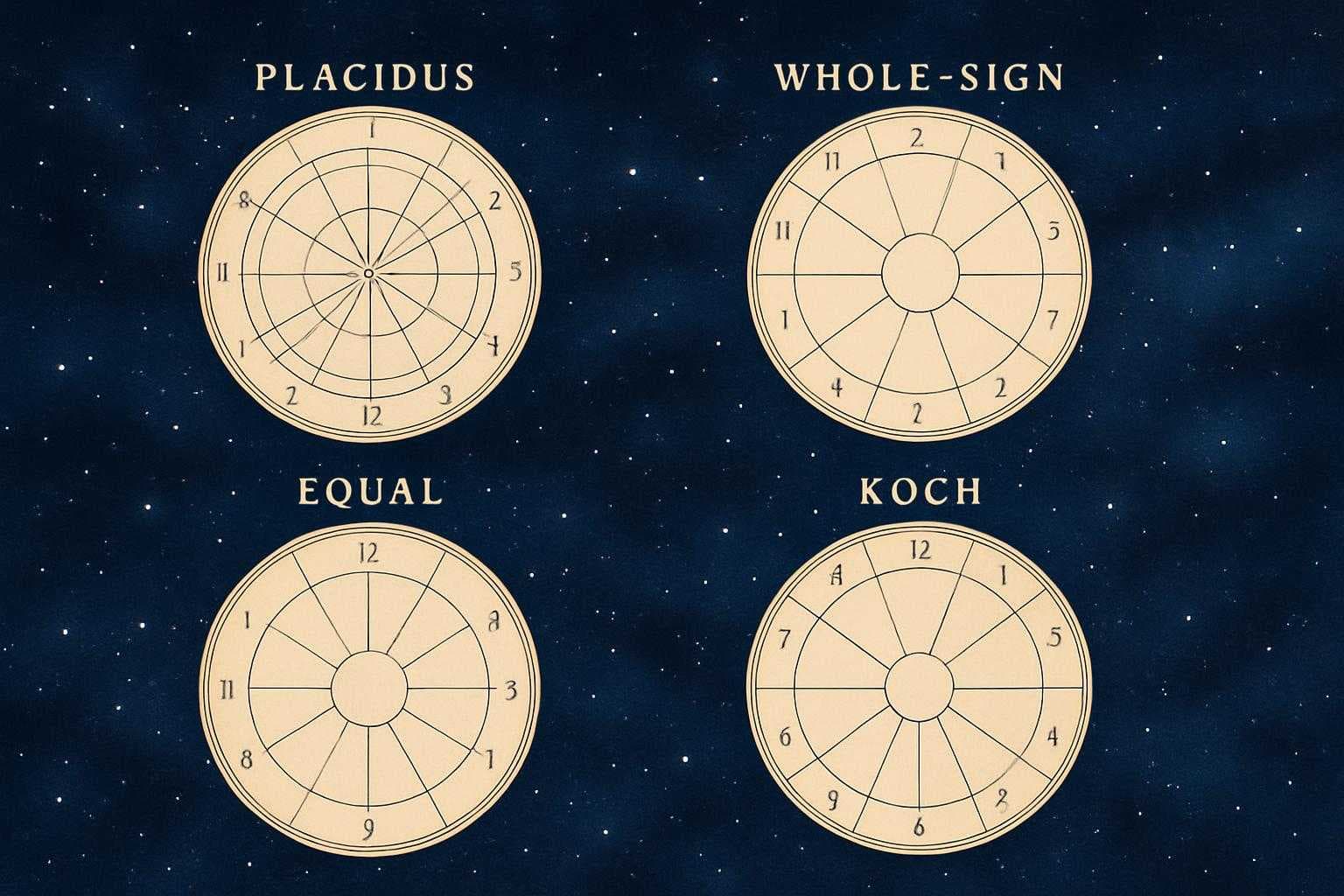
Placidus, Whole-Sign, Equal, or Koch? A Practical Comparison of Major House Systems in Vedic Astrology
July 2, 2025
Introduction
Astrology is a cosmic symphony, and the house system you choose is like selecting the sheet music that guides your interpretation. With several house systems available, each offering a unique lens, it's essential to understand how they slice the celestial pie and why results may differ. Let's dive into the Placidus, Whole-Sign, Equal, and Koch house systems, exploring their methodologies and when a Vedic astrologer might opt for one over another.
Placidus House System: The Time-Based Maestro
The Placidus system, named after 17th-century astrologer Placidus de Titis, is the most widely used in Western astrology. It divides the ecliptic based on the time it takes for each degree to rise above the horizon, resulting in houses of varying sizes. This time-based approach offers a nuanced view, reflecting the Earth's rotation and the individual's specific birth time and location. However, at higher latitudes, this system can produce distorted house sizes, making interpretations challenging. (en.wikipedia.org)
When to Use: Placidus is favored for its detailed and personalized insights, especially in psychological astrology. However, Vedic astrologers might find it less compatible due to its complexity and potential distortions at extreme latitudes.
Whole-Sign House System: The Ancient Harmonizer
Whole-Sign houses are the OG of house systems, dating back to Hellenistic astrology. In this system, each house corresponds to an entire zodiac sign, starting with the Ascendant's sign as the first house. This method results in twelve equal 30-degree houses, offering simplicity and clarity. It's the go-to in Vedic astrology, aligning seamlessly with its principles. (en.wikipedia.org)
When to Use: Vedic astrologers predominantly use Whole-Sign houses for their straightforwardness and consistency, making chart interpretation more accessible and aligned with traditional practices.
Equal House System: The Balanced Conductor
The Equal House system divides the ecliptic into twelve equal 30-degree segments, starting from the exact degree of the Ascendant. This approach ensures uniform house sizes, providing a balanced framework. It's particularly effective in regions where other systems might produce uneven houses due to geographical considerations. (en.wikipedia.org)
When to Use: Vedic astrologers might opt for the Equal House system when seeking a harmonious and symmetrical chart layout, especially when dealing with charts from higher latitudes.
Koch House System: The Time-Space Virtuoso
Developed by German astrologer Walter Koch, this system is similar to Placidus but bases house division on the birthplace's geographic latitude. It focuses on the Midheaven and uses the zodiac's arcs, offering a unique perspective. However, like Placidus, it can face challenges at extreme latitudes. (en.wikipedia.org)
When to Use: While Koch provides a detailed framework, Vedic astrologers may find it less applicable due to its complexity and potential distortions in certain geographical locations.
Why Results Differ: The Cosmic Variations
The choice of house system can lead to variations in planetary placements within houses, affecting interpretations. For instance, a planet might reside in the 7th house in one system and shift to the 6th in another, altering the focus from partnerships to service or health. Understanding these differences is crucial for accurate readings. (astrologyinaction.com)
Your Sun sign is only one note; Moon, Rising, and the rest form the full chord.
Actionable Takeaways
-
Experiment with Systems: Try casting your chart using different house systems to see which resonates with your experiences.
-
Consult a Vedic Astrologer: If you're inclined towards Vedic astrology, seek guidance from a practitioner who can provide insights aligned with traditional methods.
-
Stay Open-Minded: Remember, astrology is both an art and a science. Exploring various systems can enrich your understanding and interpretation of charts.
In the end, the house system you choose is like selecting the right instrument for your cosmic symphony. Each has its unique sound, and finding the one that harmonizes with your astrological practice is key.
No one can be defined by just one sign.
See for yourself, with a free horoscope.
Generate a Horoscope